新会话 六级考试
6级口语考试内容

6级口语考试内容1. 自我介绍在6级口语考试中,首先要进行的是自我介绍。
考生需要表达自己的姓名、年龄、籍贯、学校及专业等个人信息,并陈述自己的兴趣爱好、特长技能和人生目标等。
2. 个人经历考生需要说出自己曾经参加过的活动、比赛、志愿服务或实习等,要能清晰地表述自己在这些经历中的角色和收获。
也可以讲述一些具有代表性的经历,如旅游、生活的感悟和人生的启示等。
3. 现代科技在这个话题上,考生需要表述自己对现代科技的态度及其带来的影响。
比如可以讲述自己的手机使用习惯,对社交媒体的看法,对人工智能的看法等,同时也可以探讨新技术的应用和未来走向。
4. 人际关系在这个话题上,考生需要讲述自己与家人、朋友、同学、老师等人的关系,并讨论如何维护一个良好的人际关系。
能够表述自己在交际中的优势和劣势,并提出改进的方案。
5. 社会问题在这个话题上,考生需要谈论一些社会问题,如环境污染、贫困、教育、失业和食品安全等。
需要清晰地表述问题的产生与影响,并提出自己的观点和建议,以及针对该问题自己可以付出的行动。
6. 国外留学在这个话题上,考生需要谈论国外留学的利与弊,并表述自己对留学的看法和动机,以及打算如何准备留学计划。
还可以分享自己的留学经历和感受,以及自己在语言和文化方面的提升。
7. 健康生活在这个话题上,考生需要谈论健康生活的重要性和实践方法,如定期锻炼、饮食均衡、心理调节和保持良好的睡眠习惯等。
还可以探讨一些健康问题,如抗击病毒、心理健康和社交距离等。
总之,6级口语考试内容丰富,需要考生具备灵活应对的能力,充分展示自己的语言水平和思维能力。
六级听力题型种类
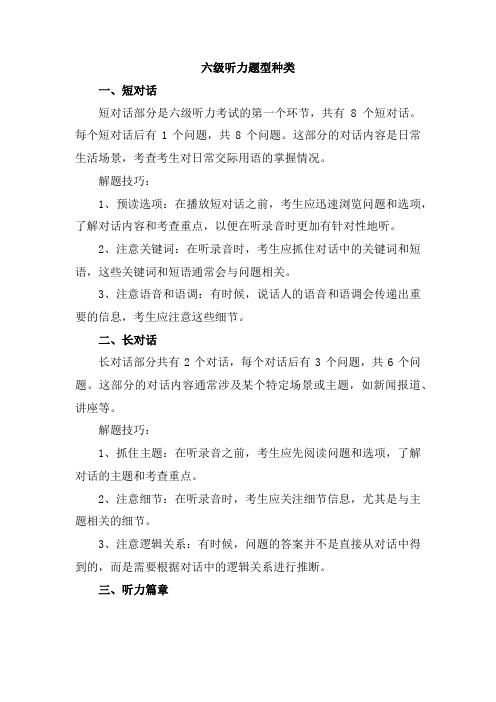
六级听力题型种类一、短对话短对话部分是六级听力考试的第一个环节,共有8个短对话。
每个短对话后有1个问题,共8个问题。
这部分的对话内容是日常生活场景,考查考生对日常交际用语的掌握情况。
解题技巧:1、预读选项:在播放短对话之前,考生应迅速浏览问题和选项,了解对话内容和考查重点,以便在听录音时更加有针对性地听。
2、注意关键词:在听录音时,考生应抓住对话中的关键词和短语,这些关键词和短语通常会与问题相关。
3、注意语音和语调:有时候,说话人的语音和语调会传递出重要的信息,考生应注意这些细节。
二、长对话长对话部分共有2个对话,每个对话后有3个问题,共6个问题。
这部分的对话内容通常涉及某个特定场景或主题,如新闻报道、讲座等。
解题技巧:1、抓住主题:在听录音之前,考生应先阅读问题和选项,了解对话的主题和考查重点。
2、注意细节:在听录音时,考生应关注细节信息,尤其是与主题相关的细节。
3、注意逻辑关系:有时候,问题的答案并不是直接从对话中得到的,而是需要根据对话中的逻辑关系进行推断。
三、听力篇章听力篇章部分共有3篇短文,每篇短文后有3个问题,共9个问题。
这部分的短文内容涉及社会、文化、科技等各个领域,难度较高。
解题技巧:1、阅读选项:在播放短文之前,考生应快速浏览问题和选项,了解短文的主题和考查重点。
2、注意关键词:在听录音时,考生应抓住文章中的关键词和短语,这些关键词和短语通常会与问题相关。
3、注意语调和语气:有时候,说话人的语调和语气会传递出重要的信息,考生应注意这些细节。
4、注意上下文:有时候,问题的答案需要在上下文中寻找线索,考生应注意文章中的逻辑关系和细节信息。
四、讲座/讲话讲座/讲话部分是一个较长的录音片段,通常是一位教授或专业人士就某个特定主题进行讲解或发表演讲。
这部分的录音内容通常较为正式和专业。
解题技巧:1、抓住主题:在听录音之前,考生应先阅读问题和选项,了解讲座/讲话的主题和考查重点。
2、注意细节:在听录音时,考生应关注细节信息,尤其是与主题相关的细节。
2023年大学_大学英语四、六级考试新题型调整的说明
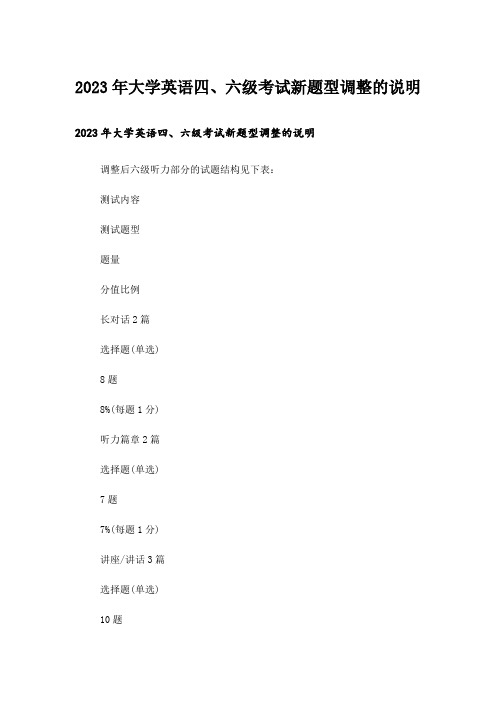
2023年大学英语四、六级考试新题型调整的说明2023年大学英语四、六级考试新题型调整的说明调整后六级听力部分的试题结构见下表:测试内容测试题型题量分值比例长对话2篇选择题(单选)8题8%(每题1分)听力篇章2篇选择题(单选)7题7%(每题1分)讲座/讲话3篇选择题(单选)10题20%(每题2分)1、六级听力之不变原来的长对话题型不变,依然是2篇。
但题目数量由7道题增至8题,依然每题1分;篇章听力题型不变,但题目数量由原来的3篇共10道题减少至2篇共7题,每题1分。
题型及难度没有变化,考生可参考旧题。
2、六级听力之变化短对话取消,听写取消。
增加讲座/讲话题型3篇共10道题,每题2分,是六级听力考试乃至全卷的关键。
下面我们就来详细解析一下新题型:Now listen to the following recording and answer questions 16 to 19.16. A) They investigate the retirement homes in America.B) They are on issues facing senior citizens in America.C) They describe the great pleasures of the golden years.D) They are filled with fond memories of his grandparents.17. A) The loss of the ability to take care of himself.B) The feeling of not being important any more.C) Being unable to find a good retirement home.D) Leaving the home he had lived in for 60 years.18. A) The loss of identity and self-worth.B) Fear of being replaced or discarded.C) Freedom from pressure and worldly cares.D) The possession of wealth and high respect.19. A) The urgency of pension reform.B) Medical care for senior citizens.C) Finding meaningful roles for the elderly in society.D) The development of public facilities for senior citizens.原文:Moderator:Hello Ladies and Gentleman, it gives me great pleasure to introduce our keynote speaker for todays session, Dr. Howard Miller. Dr. Miller, Professor of Sociology at Washington University, has written numerous articles and books on the issues facing older Americans in our graying society for the past 15 years. Dr. Miller:Dr. Miller: Thank you for that introduction. Today, Id like to preface my remarks with a story from my own life which I feel highlights the common concerns that bring us here together. Several years ago when my grandparents were well into their eighties, they were faced with the reality of no longer being able to adequately care for themselves. My grandfather spoke of his greatest fear, that of leaving the only home they had known for the past 60 years. Fighting back the tears, he spoke proudly of the fact that he had built their home from the ground up, and that he had pounded every nail and laid every brick in the process. The prospect of having to sell their home and give up their independence, and move into a retirement home was an extremely painful experience for them. It was,in my grandfathers own words, like having a limb cut off. He exclaimed in a forceful manner that he felt he wasnt important anymore.For them and some older Americans, their so-called “golden years”are at times not so pleasant, for this period can mean the decline of not only ones health but the loss of identity and self-worth. In many societies, this self-identity is closely related with our social status, occupation, material possessions, or independence. Furthermore, we often live in societies that value what is “new” or in fashion, and our own usage of words in the English language is often a sign of bad news for older Americans. I mean how would your family react if you came home tonight exclaiming, “Hey, come to the living room and see the OLD black and white TV I brought!” Unfortunately, the word “old” calls to mind images of the need to replace or discard.Now, many of the lectures given at this conference have focused on the issues of pension reform, medical care, and the development of public facilities for senior citizens. And while these are vital issues that must be addressed, Id like to focus my comments on an important issue that will affect the overall success of the other programs mentioned. This has to do with changing our perspectives on what it means to be a part of this group, and finding meaningful roles the elderly can play and should play in our societies.First of all, Id like to talk about . . .16. What does the introduction say about Dr. Howard Millers articles and books?17. What is the greatest fear of Dr. Millers grandfather?18. What does Dr. Miller say the “golden years” can often mean?19. What is the focus of Dr. Millers speech?解:这是一篇关于老龄化社会,老年人的晚年生活等问题的演讲。
四六级口语考试说明

四六级口语考试说明大学英语四、六级考试口语考试(CET Spoken English Test,简称CET-SET)用于测量我国大学生运用英语进行口头交际的能力。
考试分为全国大学英语四级口语考试(CET-SET4),全国大学英语六级口语考试(CET-SET6)。
1.报考资格从2016年11月起,口试不需要笔试过一定分数线才能报考,完成当次的四、六级笔试报考就能报考口语考试(非必考),口试笔试分开考。
每年5月的口语考试对应6月份的笔试,11月的口语考试对应12月份的笔试。
2.考核要求及考核的技能大学英语四、六级口语考试主要考核学生的英语口头表达能力,具体为:就熟悉话题进行比较流利的会话能力;表达个人意见、情感、观点的能力;陈述事实、理由和描述事件的能力。
考试采用计算机化考试。
考生在计算机上进行考生与模拟考官、考生与考生之间的互动。
请提前登录全国大学英语四、六级考试网站(),熟悉考试流程。
口语部分考核学生就熟悉的话题用英语进行口头表达与交流的能力。
口语部3.考试时间口语考试每年举行两次,分别在5月和11月,各自对应6月份和12月份的两次笔试。
4.报考方法和成绩查询考生登录全国大学英语四、六级考试网站()点击<CET口试报名>栏目进行报名,完成信息填报、选择考点、网上缴费等报名手续。
考生也可以安装“CET”手机APP,完成报名。
“CET”手机APP现在具备口试报名、口试准考证打印、口试成绩推送等功能。
成功完成报名的考生登录全国大学英语四、六级考试网站()或手机APP自行打印准考证;考生的考试具体时间及地点均以准考证上所示为准,不得更改。
成绩查询时间,分别为每年的八月和二月的中下旬,与笔试成绩一同公布。
具体发布的时间和方式以全国大学英语四、六级考试网站()发布的公告为准。
成绩报告单将同时报道口试成绩及同一考次的笔试成绩,如考生仅参加笔试,成绩报告单照常发放,口试成绩栏部分显示为空;成绩单将发至笔试报考学校。
全国公共英语口语等级考试(最新)
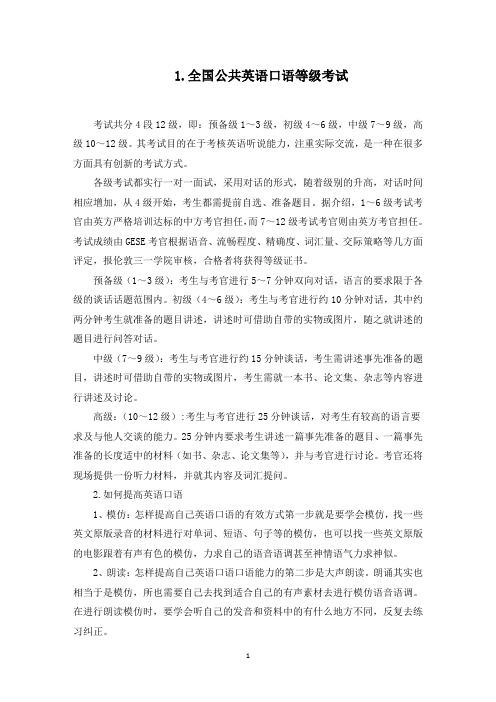
1.全国公共英语口语等级考试考试共分4段12级,即:预备级1~3级,初级4~6级,中级7~9级,高级10~12级。
其考试目的在于考核英语听说能力,注重实际交流,是一种在很多方面具有创新的考试方式。
各级考试都实行一对一面试,采用对话的形式,随着级别的升高,对话时间相应增加,从4级开始,考生都需提前自选、准备题目。
据介绍,1~6级考试考官由英方严格培训达标的中方考官担任,而7~12级考试考官则由英方考官担任。
考试成绩由GESE考官根据语音、流畅程度、精确度、词汇量、交际策略等几方面评定,报伦敦三一学院审核,合格者将获得等级证书。
预备级(1~3级):考生与考官进行5~7分钟双向对话,语言的要求限于各级的谈话话题范围内。
初级(4~6级):考生与考官进行约10分钟对话,其中约两分钟考生就准备的题目讲述,讲述时可借助自带的实物或图片,随之就讲述的题目进行问答对话。
中级(7~9级):考生与考官进行约15分钟谈话,考生需讲述事先准备的题目,讲述时可借助自带的实物或图片,考生需就一本书、论文集、杂志等内容进行讲述及讨论。
高级:(10~12级):考生与考官进行25分钟谈话,对考生有较高的语言要求及与他人交谈的能力。
25分钟内要求考生讲述一篇事先准备的题目、一篇事先准备的长度适中的材料(如书、杂志、论文集等),并与考官进行讨论。
考官还将现场提供一份听力材料,并就其内容及词汇提问。
2.如何提高英语口语1、模仿:怎样提高自己英语口语的有效方式第一步就是要学会模仿,找一些英文原版录音的材料进行对单词、短语、句子等的模仿,也可以找一些英文原版的电影跟着有声有色的模仿,力求自己的语音语调甚至神情语气力求神似。
2、朗读:怎样提高自己英语口语口语能力的第二步是大声朗读。
朗诵其实也相当于是模仿,所也需要自己去找到适合自己的有声素材去进行模仿语音语调。
在进行朗读模仿时,要学会听自己的发音和资料中的有什么地方不同,反复去练习纠正。
3、复述:复述不是背诵,复述是通过自己的语言将你所听到的故事或者所看到的文章描述出来,在摆脱原文文本和组织结构,用自己的理解和思考将故事的内容讲出。
大学六级详解

大学六级详解大学英语六级考试,是中国学生的一次重要英语语言能力考试。
在这次考试中,考生需要展示出他们的听力、阅读、写作和翻译等多个方面的英语能力。
本文将详细解读大学六级考试的各个部分,对考生有更详细的了解。
一、听力理解大学六级听力理解部分是考生考试中的第一项任务。
这部分共有三篇长对话和三篇短文,每篇对话或者短文后面都有几个问题,考生需要根据听到的录音内容回答问题。
这个部分的目的在于考察考生对于英语口语对话的理解能力以及对于日常行为和习惯的了解程度。
要做好这个部分,考生需要多听英语对话,培养自己对于不同口音和语速的听力适应能力。
二、阅读理解大学六级阅读理解部分是考生考试中的第二个任务。
这部分共有三篇阅读材料,每篇约500词左右,每篇后面都有几个问题,考生需要根据材料内容回答问题。
这个部分的目的在于考察考生的阅读理解能力及分析能力。
要顺利完成这个部分,考生需要掌握一定的阅读技巧,如快速浏览、找关键词、理解上下文等。
三、写作能力大学六级写作部分是考生考试中的第三个任务。
这部分分为两个小节,第一个小节要求考生根据一张图表或者图画写一篇150词左右的短文;第二个小节要求考生根据一个指定的题目写一篇300词左右的作文。
这个部分的目的在于考察考生的写作能力,包括语法运用、词汇丰富度、句子结构和逻辑思维能力等。
要在这个部分取得好成绩,考生需要多练习写作,积累一定的写作素材和表达方式。
四、翻译技巧大学六级翻译部分是考生考试中的最后一个任务。
这部分分为两个小节,第一个小节要求考生根据一段英语短文进行汉译英,第二个小节要求考生根据一段汉语短文进行英译汉。
这个部分的目的在于考察考生的翻译能力,包括对于不同语言之间的表达方式和词汇的理解。
要做好这个部分,考生需要掌握一定的翻译技巧,如理解句子结构、把握上下文、选择合适的词汇等。
综上所述,大学六级考试是一场全面考察考生英语能力的考试。
通过对听力、阅读、写作和翻译等多个方面的考察,可以全面了解考生的英语水平。
2023年12月大学英语六级考试真题及答案(第二套)
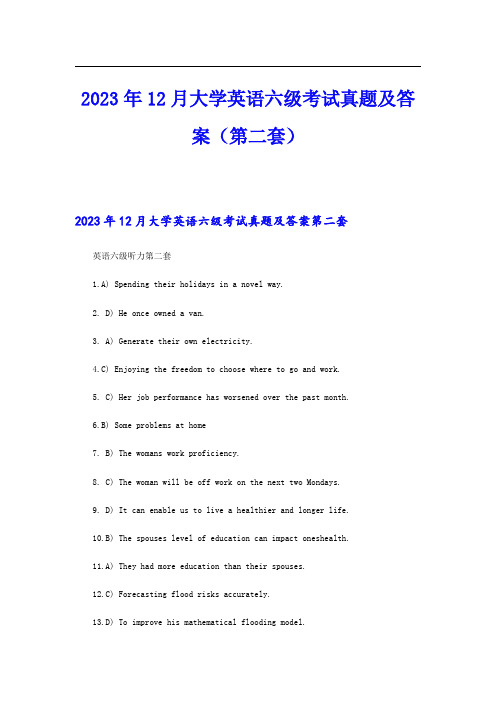
2023年12月大学英语六级考试真题及答案(第二套)2023年12月大学英语六级考试真题及答案第二套英语六级听力第二套1.A) Spending their holidays in a novel way.2. D) He once owned a van.3. A) Generate their own electricity.4.C) Enjoying the freedom to choose where to go and work.5. C) Her job performance has worsened over the past month.6.B) Some problems at home7. B) The womans work proficiency.8. C) The woman will be off work on the next two Mondays.9. D) It can enable us to live a healthier and longer life.10.B) The spouses level of education can impact oneshealth.11.A) They had more education than their spouses.12.C) Forecasting flood risks accurately.13.D) To improve his mathematical flooding model.14.A) To forecast rapid floods in real time.15.B) They set up Internet-connected water-level sensors.16.B) To argue about the value of a college degree.17.D) The factor of wages.18.A) The sharp decline in marriage among men with no college degrees.19.C) More and more people prioritize animal welfare when buying things to wear.20.D)Avoided the use of leather and fur.21.A)Whether they can be regarded as ethical.22.D) The era we live in is the most peaceful in history.23.C) They believed the world was deteriorating.24.B) Our psychological biases.25.A) Paying attention to negative information.翻译第二篇在中国,随着老龄化社会的到来,养老受到普遍关注。
hsk6级题型
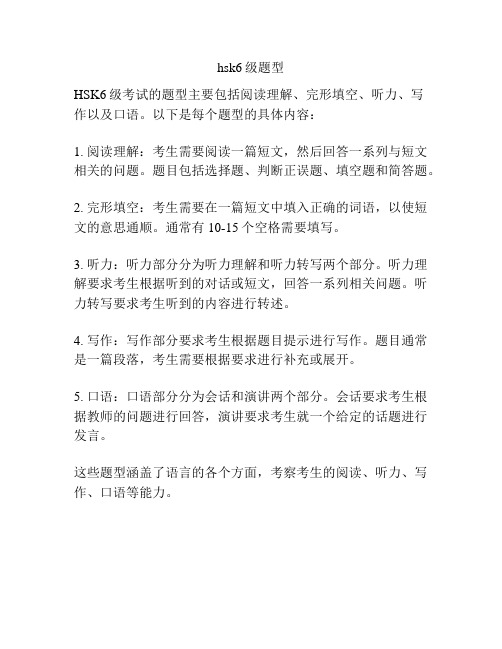
hsk6级题型
HSK6级考试的题型主要包括阅读理解、完形填空、听力、写
作以及口语。
以下是每个题型的具体内容:
1. 阅读理解:考生需要阅读一篇短文,然后回答一系列与短文相关的问题。
题目包括选择题、判断正误题、填空题和简答题。
2. 完形填空:考生需要在一篇短文中填入正确的词语,以使短文的意思通顺。
通常有10-15个空格需要填写。
3. 听力:听力部分分为听力理解和听力转写两个部分。
听力理解要求考生根据听到的对话或短文,回答一系列相关问题。
听力转写要求考生听到的内容进行转述。
4. 写作:写作部分要求考生根据题目提示进行写作。
题目通常是一篇段落,考生需要根据要求进行补充或展开。
5. 口语:口语部分分为会话和演讲两个部分。
会话要求考生根据教师的问题进行回答,演讲要求考生就一个给定的话题进行发言。
这些题型涵盖了语言的各个方面,考察考生的阅读、听力、写作、口语等能力。
大学英语六级考试听力理解部分主要涉及三种题型
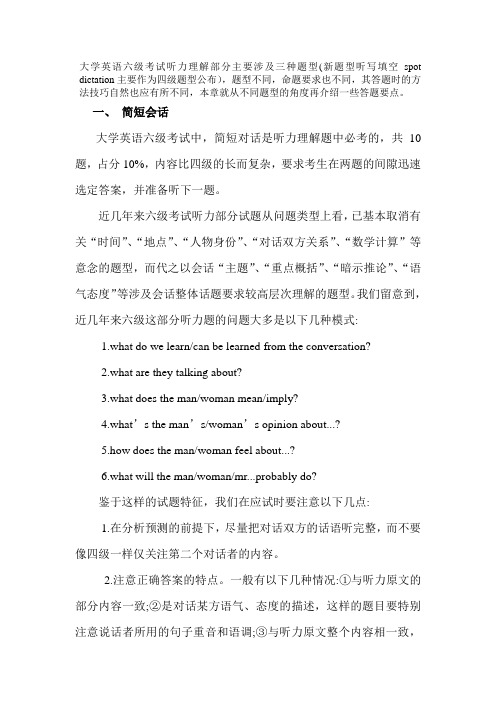
大学英语六级考试听力理解部分主要涉及三种题型(新题型听写填空spot dictation主要作为四级题型公布),题型不同,命题要求也不同,其答题时的方法技巧自然也应有所不同,本章就从不同题型的角度再介绍一些答题要点。
一、简短会话大学英语六级考试中,简短对话是听力理解题中必考的,共10题,占分10%,内容比四级的长而复杂,要求考生在两题的间隙迅速选定答案,并准备听下一题。
近几年来六级考试听力部分试题从问题类型上看,已基本取消有关“时间”、“地点”、“人物身份”、“对话双方关系”、“数学计算”等意念的题型,而代之以会话“主题”、“重点概括”、“暗示推论”、“语气态度”等涉及会话整体话题要求较高层次理解的题型。
我们留意到,近几年来六级这部分听力题的问题大多是以下几种模式:1.what do we learn/can be learned from the conversation?2.what are they talking about?3.what does the man/woman mean/imply?4.what’s the man’s/woman’s opinion about...?5.how does the man/woman feel about...?6.what will the man/woman/mr...probably do?鉴于这样的试题特征,我们在应试时要注意以下几点:1.在分析预测的前提下,尽量把对话双方的话语听完整,而不要像四级一样仅关注第二个对话者的内容。
2.注意正确答案的特点。
一般有以下几种情况:①与听力原文的部分内容一致;②是对话某方语气、态度的描述,这样的题目要特别注意说话者所用的句子重音和语调;③与听力原文整个内容相一致,要求在概括归纳的基础上得出;④是听力原文的延伸和推断,注意推断时必须忠实于原文,当然也不必丝毫不差地再现原文,答案只要能表达原文中部分信息,甚至可不包含原文表层信息,但必须是原文的实质。
HSK六级
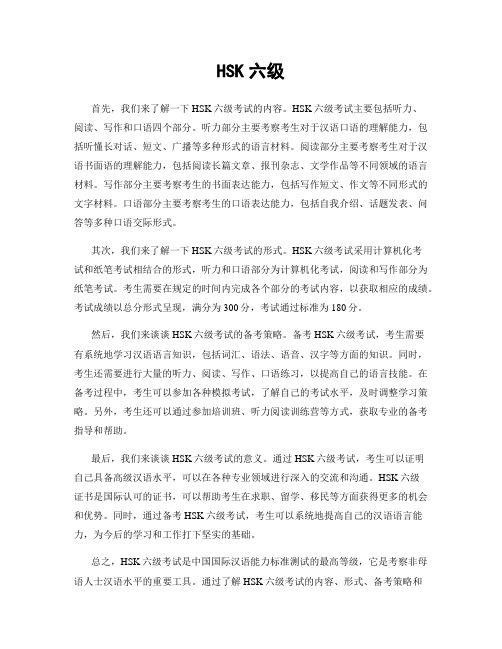
HSK六级首先,我们来了解一下HSK六级考试的内容。
HSK六级考试主要包括听力、阅读、写作和口语四个部分。
听力部分主要考察考生对于汉语口语的理解能力,包括听懂长对话、短文、广播等多种形式的语言材料。
阅读部分主要考察考生对于汉语书面语的理解能力,包括阅读长篇文章、报刊杂志、文学作品等不同领域的语言材料。
写作部分主要考察考生的书面表达能力,包括写作短文、作文等不同形式的文字材料。
口语部分主要考察考生的口语表达能力,包括自我介绍、话题发表、问答等多种口语交际形式。
其次,我们来了解一下HSK六级考试的形式。
HSK六级考试采用计算机化考试和纸笔考试相结合的形式,听力和口语部分为计算机化考试,阅读和写作部分为纸笔考试。
考生需要在规定的时间内完成各个部分的考试内容,以获取相应的成绩。
考试成绩以总分形式呈现,满分为300分,考试通过标准为180分。
然后,我们来谈谈HSK六级考试的备考策略。
备考HSK六级考试,考生需要有系统地学习汉语语言知识,包括词汇、语法、语音、汉字等方面的知识。
同时,考生还需要进行大量的听力、阅读、写作、口语练习,以提高自己的语言技能。
在备考过程中,考生可以参加各种模拟考试,了解自己的考试水平,及时调整学习策略。
另外,考生还可以通过参加培训班、听力阅读训练营等方式,获取专业的备考指导和帮助。
最后,我们来谈谈HSK六级考试的意义。
通过HSK六级考试,考生可以证明自己具备高级汉语水平,可以在各种专业领域进行深入的交流和沟通。
HSK六级证书是国际认可的证书,可以帮助考生在求职、留学、移民等方面获得更多的机会和优势。
同时,通过备考HSK六级考试,考生可以系统地提高自己的汉语语言能力,为今后的学习和工作打下坚实的基础。
总之,HSK六级考试是中国国际汉语能力标准测试的最高等级,它是考察非母语人士汉语水平的重要工具。
通过了解HSK六级考试的内容、形式、备考策略和意义,考生可以更好地准备和应对这一考试,提高自己的汉语语言能力,为未来的发展打下坚实的基础。
六级口试合格
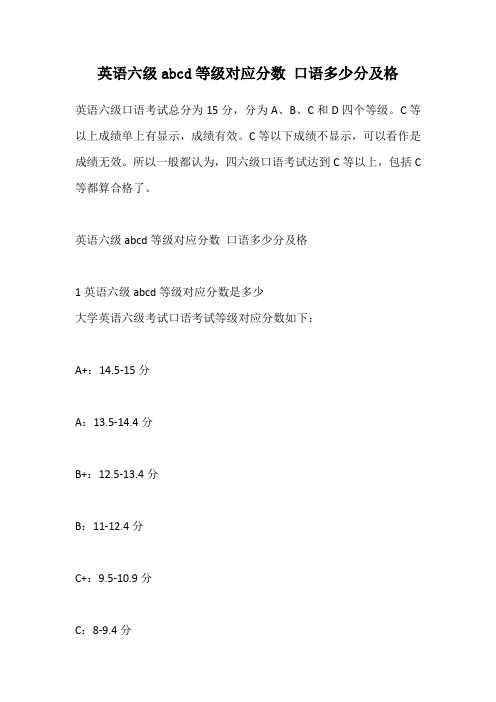
英语六级abcd等级对应分数口语多少分及格
英语六级口语考试总分为15分,分为A、B、C和D四个等级。
C等以上成绩单上有显示,成绩有效。
C等以下成绩不显示,可以看作是成绩无效。
所以一般都认为,四六级口语考试达到C等以上,包括C 等都算合格了。
英语六级abcd等级对应分数口语多少分及格
1英语六级abcd等级对应分数是多少
大学英语六级考试口语考试等级对应分数如下:
A+:14.5-15分
A:13.5-14.4分
B+:12.5-13.4分
B:11-12.4分
C+:9.5-10.9分
C:8-9.4分
D:7.9分以下
2英语四六级口语考试评分标准
大学英语六级考试口语考试等级标准如下:
A等级:能用英语就一般性话题进行深入的交谈。
能清晰、流利地表达个人意见、情感、观点等。
能详细地陈述事实、理由和描述事件、现象等。
B等级:能用英语就一般性话题进行较深入的交谈。
能较清晰、较连贯地表达个人意见、情感、观点等。
能较详细地陈述事实、理由和描述事件、现象等。
C等级:能用英语就一般性话题进行简单的交谈。
能基本表达个人意见、情感、观点等。
能简单地陈述事实、理由和描述事件、现象等。
D等级:尚不具备基本的英语口头交际能力。
英语四六级口语考试的评分标准
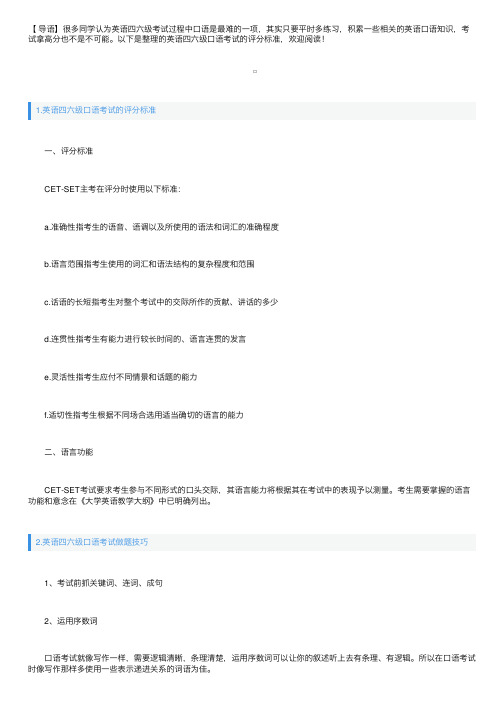
【导语】很多同学认为英语四六级考试过程中⼝语是最难的⼀项,其实只要平时多练习,积累⼀些相关的英语⼝语知识,考试拿⾼分也不是不可能。
以下是整理的英语四六级⼝语考试的评分标准,欢迎阅读!1.英语四六级⼝语考试的评分标准 ⼀、评分标准 CET-SET主考在评分时使⽤以下标准: a.准确性指考⽣的语⾳、语调以及所使⽤的语法和词汇的准确程度 b.语⾔范围指考⽣使⽤的词汇和语法结构的复杂程度和范围 c.话语的长短指考⽣对整个考试中的交际所作的贡献、讲话的多少 d.连贯性指考⽣有能⼒进⾏较长时间的、语⾔连贯的发⾔ e.灵活性指考⽣应付不同情景和话题的能⼒ f.适切性指考⽣根据不同场合选⽤适当确切的语⾔的能⼒ ⼆、语⾔功能 CET-SET考试要求考⽣参与不同形式的⼝头交际,其语⾔能⼒将根据其在考试中的表现予以测量。
考⽣需要掌握的语⾔功能和意念在《⼤学英语教学⼤纲》中已明确列出。
2.英语四六级⼝语考试做题技巧 1、考试前抓关键词、连词、成句 2、运⽤序数词 ⼝语考试就像写作⼀样,需要逻辑清晰,条理清楚,运⽤序数词可以让你的叙述听上去有条理、有逻辑。
所以在⼝语考试时像写作那样多使⽤⼀些表⽰递进关系的词语为佳。
3、互动 在四六级⼝语考试中,除了考⽣与模拟考官之间的问答外,还有⼀个环节就是考⽣与搭档之间的互动。
这就有点像BEC ⼝语考试了。
你会有⼀个搭档,与你共同完成这个题,考官不仅仅以你个⼈的表现来评判,更加看重你与搭档之间的互动合作,所以,在这种情况,你与搭档的互动⼀定要热烈,让考官听出你是在运⽤⾃⼰的⼝语储备答题⽽不是在照本宣科的背模版。
4、积累地道英语⼝语表达 其实所有的⼝语考试都是万变不离其宗,多⽤⼀些地道的英语⼝语表达。
平时的时候就要注意多积累⼀些地道⼝语表达。
3.英语四六级⼝语考试注意事项 ⼀、⼝语正式开始之前有五分钟调试设备的时间,在这五分钟内,抓紧时间试⾳检查你的⽿机是否有问题,如果有问题,抓紧向⽼师报告更换。
2023年12月英语六级考试真题及答案详解和听力原文第二套
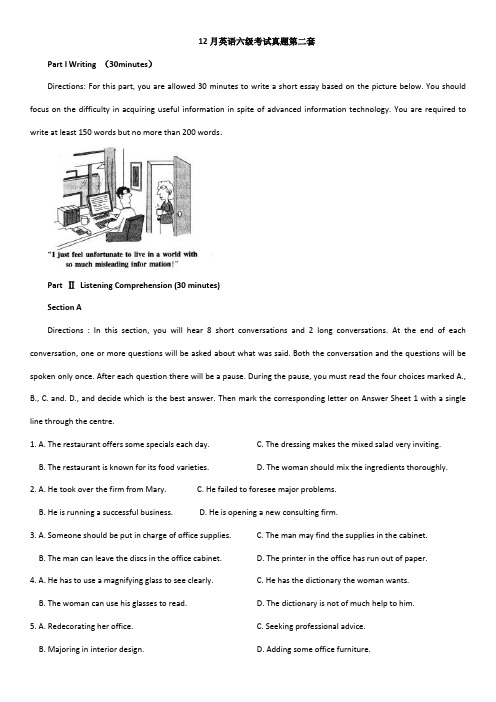
12月英语六级考试真题第二套Part I Writing (30minutes)Directions: For this part, you are allowed 30 minutes to write a short essay based on the picture below. You should focus on the difficulty in acquiring useful information in spite of advanced information technology. You are required to write at least 150 words but no more than 200 words.Part ⅡListening Comprehension (30 minutes)Section ADirections : In this section, you will hear 8 short conversations and 2 long conversations. At the end of each conversation, one or more questions will be asked about what was said. Both the conversation and the questions will be spoken only once. After each question there will be a pause. During the pause, you must read the four choices marked A., B., C. and. D., and decide which is the best answer. Then mark the corresponding letter on Answer Sheet 1 with a single line through the centre.1. A. The restaurant offers some specials each day.B. The restaurant is known for its food varieties.C. The dressing makes the mixed salad very inviting.D. The woman should mix the ingredients thoroughly.2. A. He took over the firm from Mary. C. He failed to foresee major problems.B. He is running a successful business. D. He is opening a new consulting firm.3. A. Someone should be put in charge of office supplies.B. The man can leave the discs in the office cabinet.C. The man may find the supplies in the cabinet.D. The printer in the office has run out of paper.4. A. He has to use a magnifying glass to see clearly.B. The woman can use his glasses to read.C. He has the dictionary the woman wants.D. The dictionary is not of much help to him.5. A. Redecorating her office.B. Majoring in interior design.C. Seeking professional advice.D. Adding some office furniture.6. A. Problems in port management.B. Improvement of port facilities.C. Delayed shipment of goods.D. Shortage of container ships.7.A. Their boss. B. A colleague. C. Their workload. D. A coffee machine.8. A. Call the hotel manager for help.B. Postpone the event until a later date.C. Hold the banquet at a different place.D. Get an expert to correct the error.Questions 9 to 11 are based on the conversation you have just heard.9 .A. He shares some of the household duties.B. He often goes back home late for dinner.C. He cooks dinner for the family occasionally.D. He dines out from time to time with friends.10. A. To take him to dinner.B. To talk about a budget plan.C. To discuss an urgent problem.D. To pass on an important message.11. A. Foreign investors are losing confidence in India's economy.B. Many multinational enterprises are withdrawing from India.C. There are wild fluctuations in the international money market.D. There is a sharp increase in India's balance of payment deficit. Questions 12 to 15 are based on the conversation you have just heard.12. A. They have unrealistic expectations about the other half.B. They may not be prepared for a lifelong relationship.C. They form a more realistic picture of life.D. They try to adapt to their changing roles.13. A. He is lucky to have visited many exotic places.B. He is able to forget all the troubles in his life.C. He is able to meet many interesting people.D. He is lucky to be able to do what he loves.14.A. It is stressful. B. It is full of time. C. It is all glamour. D. It is challenging15. A. Bothered. B. Amazed. C. Puzzled. D. Excited.Section BDirections : In this section, you will hear 3 short passages. At the end of each passage, you will hear some questions. Both the passage and the questions will be spoken only once. After you hear a question, you must choose the best answer from the four choices marked A., B.,C. and D . Then mark the corresponding letter on Answer Sheet I with a single line through the centre.Passage OneQuestions 16 to 18 are based on the passage you have just heard.16. A. Maintain the traditional organizational culture.B. Learn new ways of relating and working together.C. Follow closely the fast development of technology.D. Learn to be respectful in a hierarchical organization.17. A. How the team integrates with what it is supposed to serve.B. How the team is built to keep improving its performance.C. What type of personnel the team should be composed of.D. What qualifications team members should be equipped with.18. A. A team manager must set very clear and high objectives.B. Teams must consist of members from different cultures.C. Team members should be knowledgeable and creative.D. A team manager should develop a certain set of skills.Passage TwoQuestions 19 to 22 are based on the passage you have just heard.19. A. It is a platform for sharing ideas on teaching at the University of Illinois.B. It was mainly used by scientists and technical people to exchange text.C. It started off as a successful program but was unable to last long.D. It is a program allowing people to share information on the Web.20. A. He visited a number of famous computer scientists.B. He met with an entrepreneur named Jim Clark.C. He sold a program developed by his friends.D. He invested in a leading computer business.21. A. They had confidence in his new ideas.B. They trusted his computer expertise.C. They were very keen on new technology.D. They believed in his business connections.Passage ThreeQuestions 22 to 25 are based on the passage you have just heard.22. A. Prestige advertising.B. Institutional advertising.C. Word of mouth advertising.D. Distributing free trial products.23. A. To sell a particular product.B. To build up their reputation.C. To promote a specific service.D. To attract high-end consumers.24. A. By using the services of large advertising agencies.B. By hiring their own professional advertising staff.C. By buying media space in leading newspapers.D. By creating their own ads and commercials.25. A. Decide on what specific means of communication to employ.B. Conduct a large-scale survey on customer needs.C. Specify the objectives of the campaign in detail.D. Pretest alternative ads or commercials in certain regions.Section CDirections: In this section, you will hoar a passage three times. When the passage is read for the first time, you should listen carefully for its general idea. When the passage is read for the second time, you are required to fill in the blanks with the exact words you have just hoard. Finally, when the passage is read for the third time, you should chock what you have written.Extinction is difficult concept to grasp. It is an(26)concept. It's not at all like the killing of individual life forms that can be renewed through normal processes of reproduction. Nor is it simply(27)numbers. Nor is it damage that can somehow be remedied or for which some substitute can be found. Nor is it something that simply affects our own generation. Nor is it something that could be remedied by some supernatural power. It is rather an(28)and final act for which there is no remedy on earth or in heaven. A species once extinct is gone forever. However many generations (29)us in coming centuries, none of them will ever see this species that we extinguish. Not only are we bringing about the extinction of life(30), we are also making the land and the air and the sea so toxic that the very conditions of life are being destroyed.(31)basic natural resources, not only are the nonrenewable resources being(32)in a frenzy ( 疯狂) of processing, consuming, and(33), but we are also mining much of our renewable resources, such as the very soil itself on which terrestrial (地球上旳) life depends.The change that is taking place on the earth and in our minds is one of the greatest changes ever to take place in human affairs, perhaps the greatest, since what we are talking about is not simply another historical change or cultural (34), but a change of geological and biological as well as psychological order of(35).Part ⅢReading Comprehension (40 minutes)Section ADirections: In this section, there is a passage with ten blanks. You are required to select one word for each blank from a list of choices given in a word bank following the passage. Read the passage through carefully before making yourchoices. Each choice in the bank is identified by a letter. Please mark the corresponding letter for each item on Answer Sheet 2 with a single line through the centre. You may not use any of the words in the bank more than once.Questions 36 to 45 are based on the following passage.It seems to be a law in the technology industry that leading companies eventually lose their positions, often quickly and brutally. Mobile phone champion Nokia, one of Europe's biggest technology success stories, was no(36), losing its market share in just a few years.In , Nokia accounted for more than 40% of mobile phone sales(37)But consumers'preferences were already(38)toward touch-screen smart phones. With the introduction of Apple's phone in the middle of that year, Nokia's market share(39)rapidly and revenue plunged. By the end of , Nokia had sold its phone business to Microsoft.What sealed Nokia's fate was a series of decisions made by Stephen Elop in his position as CEO, which he(40)in October . Each day that Elop spent in charge of Nokia, the company's market value declined by $ 23 million, making him, by the numbers, one of the worst CEOs in history. But Elop was not the only person at(41)Nokia's board resisted change, making it impossible for the company to adapt to rapid shifts in the industry. Most(42), Jorma Ollila, who had led Nokia's transition from an industrial company to a technology giant, was too fascinated by the company's(43)success to recognize the change that was needed to sustain its competitiveness. The company also embarked on a(44)cost-cutting program, which included the elimination of thousands of jobs. This contributed to the(45) of the company’s once-spirited culture.which had motivated employees to take risks and make miracles. Good leaders left the company, taking Nokia's sense of vision and directions with them. Not surprisingly, much of Nokia's most valuable design and programming talent left as well.A. assumedB. biasC. desperateD. deteriorationE. exceptionF. faultG. incidentallyH. notablyI. previousJ. relayedK. shiftingL. shrankM. subtleN. transmittingO. worldwideSection BDirections : In this section, you are going to read a passage with ten statements attached to it. Each statement contains information given in one of the paragraphs. Identify the paragraph from which the information is derived. You may choose a paragraph more than once.Each paragraph is marked with a letter. Answer the questions by marking the corresponding letter on Answer Sheet 2.First-Generation College-Goers: Unprepared and Behind Kids who are the first in their families to brave the world of higher education come on campus with little academic know—how and are much more likely than their peers to drop out before graduation.[ A] When Nijay Williams entered college last fall as a first—generation student and Jamaican immigrant, he was academically unprepared for the rigors of higher education. Like many first—generation students, he enrolled in a medium-sized state university many of his high school peers were also attending, received a Pell Grant, and took out some small federal loans to cover other costs.Given the high price of room and board and the closeness of the school to his family, he chose to live at home and worked between 30 and 40 hours a week while taking a full class schedule.[ B] What Nijay didn't realize about his school—Tennessee State University—was its frighteningly low graduation rate: a mere 29 percent for its first-generation students. At the end of his first year, Nijay lost his Pell Grant of over $ 5,000 after narrowly missing the 2.0 GPA cut-off, making it impossible for him to continue paying for school.[ C ]Nijay represents a large and growing group of Americans: first—generation college students who enter school unprepared or behind. To make matters worse, these schools are ill-equipped to graduate these students—young adults who face specific challenges and obstacles. They typically carry financial burdens that outweigh those of their peers, are more likely to work while attending school, and often require significant academic remediation (补习).[ D ] Matt Rubinoff directs I'm First, a nonprofit organization launched last October to reach out to this specific population of students. He hopes to distribute this information and help prospective college-goers fad the best post-secondary fit. And while Rubinoff believes there are a good number of four—year schools that truly care about these students and set aside significant resources and programs for them, he says that number isn't high enough.[ E ] "It's not only the selective and elite institutions that provide those opportunities for a small subset of this population," Rubinoff said, adding that a majority of first-generation undergraduates tend toward options such as online programs, two—year colleges, and commuter state schools."Unfortunately, there tends to be a lack of information and support to help students think bigger and broader. "[ F] Despite this problem, many students are still drawn to these institutions--and two-year schools in particular. As a former high school teacher, I saw students choose familiar, cheaper options year after year. Instead of skipping out on higher education altogether, they chose community colleges or state schools with low bars for admittance.[ G]"They underestimate themselves when selecting a university," said Dave Jarrat, a marketing executive for InsideTrack, a for—profit organization that specializes in coaching low-income students and supporting colleges in order to help students thrive. "The reality of it is that a lot of low-income kids could be going to elite universities on a full ride scholarship and don't even realize it. "[ H] "Many students are coming from a situation where no one around them has the experience of successfully completing higher education, so they are coming in questioning themselves and their college worthiness," Jarrat continued. That helps explain why, as I'm First's Rubinoff indicated, the schools to which these students end up resorting can end up being some of the poorest matches for them. The University of Tennessee in Knoxville offers one example of this dilemma. A flagship university in the South, the school graduates just 16 percent of its first—generation students, despite its overall graduation rate of 71 percent. Located only a few hours apart, The University of Tennessee and Tennessee State are worth comparing. Tennessee State's overall graduation rate is a tiny 39 percent, but at least it has a smaller gap between the outcomes for first—generation students and those of their peers.[ I] Still, the University of Tennessee deserves credit for being transparent. Many large institutions keep this kind of data secret—or at least make it incredibly difficult to find The University of North Carolina at Chapel Hill, for instance, admits only that the graduation rate for its first—generation pupils is "much lower" than the percentage of all students who graduate within four years (81 percent).[ J] It is actually quite difficult to freed reliable statistics on the issue for many schools. Higher education institutions are, under federal law, required to report graduation rates, but these reports typically only include Pell recipient numbers —not necessarily rates specific to first—generation students. Other initiatives fail to break down the data, too. Imagine how intimidating it can be for prospective students unfamiliar with the complexities of higher education to navigate this kind of information and then identify which schools are the best fit.[ K] It was this lack of information that prompted the launch of I'm First in , originally as an ann. of its umbrella organization, the Center For Student Opportunity."If we can help to direct students to more of these types of campuses and help students to understand them to be realistic and accessible places, have them apply to these schools at greater frequency and ultimately get in and enroll, we are going to raise the success rate," Rubinoff said, citing a variety of colleges ranging from large state institutions to smaller private schools.[ L] Chelsea Jones, who now directs student programming at I'm First, was a first—generation college student at Howard. Like other student new to the intimidating higher—education world, she often struggled on her path to college, "There wasn't really a college—bound culture at my high school," she said. "I wanted to go to college but I didn't reallyknow the process. " Jones became involved with a college—access program through Princeton University in high school. Now, she attributesmuch of her understanding of college to that: "But once I got to campus, it was a completely different ball game that no one really prepared me for. "[ M] She was fortunate, though. Howard, a well—regarded historically black college, had an array of resources for its first—generation students, including matching kids with counselors, commenting first—generation students to one another, and TRIO, a national program that supported 200 students on Howard's campus. Still, Jones represents a small percentage of first-generation students who are able to gain entry into more elite universities, which are often known for robust financial aid packages and remarkably high graduation rates for first—generation students.(Harvard, for example, boasts a six—year graduation rate for underrepresented minority groups of 98 percent. ) [ N]Christian Vazquez, a first—generation Yale graduate, is another exception, his success story setting him far apart from students such as Nijay. "There is a lot of support at Yale, to an extent, after a while, there is too much support," he said, half—joking about the countless resources available at the school. Students are placed in small groups with counselors ( trained seniors on campus) ;they have access to cultural and ethnic affinity (联络) groups, tutoring centers and also have asummer orientation specifically for first—generation students ( the latter being one of the most common programs for students).[ O]"Our support structure was more like : ' You are going to get through Yale; you are going to do well,' " he said, hinting at mentors (导师), staff, and professors who all provided significant support for students who lacked confidence about "belonging" at such a top institution.46. Many first—generation college—goers have doubts about their abilities to get a college degree.47. First—generation college students tend to have much heavier financial burdens than their peers.48. The graduation rate of first—generation students at Nijay's university was incredibly low.49. Some top institutions like Yale seem to provide first—generation students with more support than they actually need.50. On entering college, Nijay Williams had no idea how challenging college education was.51. Many universities simply refuse to release their exact graduation rates for first-generation students.52. According to a marketing executive, many students from low-income families don't know they could have achance of going to an elite university.53. Some elite universities attach great importance to building up the first—generation students' serf—confidence.54. I'm First distributes information to help first-generation college-goers find schools that are most suitable for them.55. Elite universities tend to graduate fan’s-generation students at a higher rate.Section CDirections: There are 2 passages in this section. Each passage is followed by some questions or unfinished statements. For each of them there are four choices marked A., B., C. and D . You should decide on the best choice and mark the corresponding letter on Answer Sheet 2 with a single line through the centre.Passage OneQuestions 56 to 60 are based on the following passage.Saying they can no longer ignore the rising prices of health care, some of the most influential medical groups in the nation are recommending that doctors weigh the costs, not just the effectiveness of treatments, as they make decisions about patient care. The shift, little noticed outside the medical establishment but already controversial inside it, suggests that doctors are starting to redefine their roles, from being concerned exclusively about individual patients to exerting influence on how healthcare dollars are spent. In practical terms, the new guidelines being developed could result in doctors choosing one drug over another for cost reasons or even deciding that a particular treatment—at the end of life, for example—is too expensive. In the extreme, some critics have said that making treatment decisions based on cost is a form of rationing. Traditionally, guidelines have heavily influenced the practice of medicine, and the latest ones are expected to make doctors more conscious of the economic consequences of their decisions, even though there's no obligation to follow them. Medical society guidelines are also used by insurancecomoanies to help determine reimbursement (报销) policies. Some doctors see a potential conflict in trying to be both providers of patient care and facial.Overseers. "There should be forces in society who should be concerned about the budget, but they shouldn't be functioning simultaneously as doctors," said Dr. Martin Samuels at a Boston hospital. He said doctors risked losing the trust of patients if they told patients, "I'm not going to do what I think is best for you because I think it's bad for the healthcare budget in Massachusetts. " Doctors can face some grim trade—offs. Studies have shown, for example, that two drugs are about equally effective in treating macular degeneration, and eye disease. But one costs $ 50 a dose and the other close to $ 2,000. Medicare could save hundreds of millions of dollars a year if everyone used the cheaper drug, Avastin, instead ofthe costlier one, Lucentis. But the Food and Drug Administration has not approved Avastin for use in the eye. and using it rather than the alternative, Lucentis, might carry an additional, although slight, safety risk. Should doctors consider Medicare's budget in deciding what to use?"I think ethically (在道德层面上) we are just worried about the patient in front of us and not trying to save money for the insurance industry or society as a whole," said Dr. Donald Jensen. Still, some analysts say that there's a role for doctors to play in cost analysis because not many others are doing so. "In some ways," said Dr. Daniel Sulmasy, "it represents a failure of wider society to take up the issue. "56. What do some most influential medical groups recommend doctors do?A. Reflect on the responsibilities they are supposed to take.B. Pay more attention to the effectiveness of their treatments.C. Take costs into account when making treatment decisions.D. Readjust their practice in view of the cuts in health care.57. What were doctors mainly concerned about in the past?A. Specific medicines to be used.B. Effects of medical treatment.C. Professional advancement.D. Patients' trust.58. What may the new guidelines being developed lead to?A. The redefining of doctors' roles.B. Overuse of less effective medicines.C. Conflicts between doctors and patients.D. The prolonging of patients' suffering.59. What risk do doctors see in their dual role as patient care providers and financial overseers?A. They may be involved in a conflict of interest.B. They may be forced to divide their attention.C. They may have to use less effective drugs.D. They may lose the respect of patients.60. What do some experts say about doctors' involvement in medical cost analysis?A. It may add to doctors' already heavy workloads.B. It will help to save money for society as a whole.C. It results from society's failure to tackle the problem.D. It raises doctors' awareness of their social responsibilities.Passage TwoQuestions 61 to 65 are based on the following passage.Economic inequality is the "defining challenge of our time," President Barack Obama declared in a speech last monthto the Center for American Progress. Inequality is dangerous, he argued, not merely because it doesn't look good to have a large gap between the rich and the poor, but because inequality itself destroys upward mobility, making it harder for the poor to escape from poverty. "Increased inequality and decreasing mobility pose a fundamental threat to the American Dream," he said. Obama is only the most prominent public figure to declare inequality Public Enemy No. 1 and the greatest threat to reducing poverty in America. A number of prominent economists have also argued that it's harder for the poor to climb the economic ladder today because the rungs (横档) in that ladder have grown farther apart.For all the new attention devoted to the 1 percent, a new dam set from the Equality of Opportunity Project at Harvard and Berkeley suggests that, if we care about upward mobility overall, we're vastly exaggerating the dangers of the rich—poor gap. Inequality itself is not a particularly strong predictor of economic mobility, as sociologist Scott Winship noted in a recent article based on his analysis of this data. So what factors, at the community level, do predict if poor children will move up the economic ladder as adtdts? what explains, for instance, why the Salt Lake City metro area is one of the 100 largest metropolitan areas most likely to lift the fortunes of the poor and the Atlanta metro area is one of the least likely?Harvard economist Raj Cherty has pointed to economic and racial segregation, community density, the size of a community's middle class, the quality of schools, commitments religiosity, and family structure, which he calls the "single strongest correlate of upward mobility. " Chetty finds that communities like Salt Lake City, with high levels of two-parent families and religiosity, are much more likely to see poor children get ahead than communities like Atlanta, with high levels of racial and economic segregation. Chetty has not yet issued a comprehensive analysis of the relative predictive power of each of these factors. Based on my analyses of the data. of the factors that Chetty has highlighted, the following three seem to be most predictive of upward mobility in a given community.1. Per-capita (人均) income growth2. Prevalence of single mothers ( where correlation is strong, but negative)3. Per-capita local government spending In other words, communities with high levels of per-capita income growth, high percentages of two-parent families, and high local government spending-which may stand for good schools-are the most likely to help poor children relive Horatio Alger's rags-to-riches story.61. How does Obama view economic inequality?A. It is the biggest obstacle to social mobility.B. It is the greatest threat to social stability.C. It is the No. 1 enemy of income growth.D. It is the most malicious social evil of our time.62. What do we learn about the inequality gap from Scott Winship's data analysis?。
2023年四六级口语考试安排通用
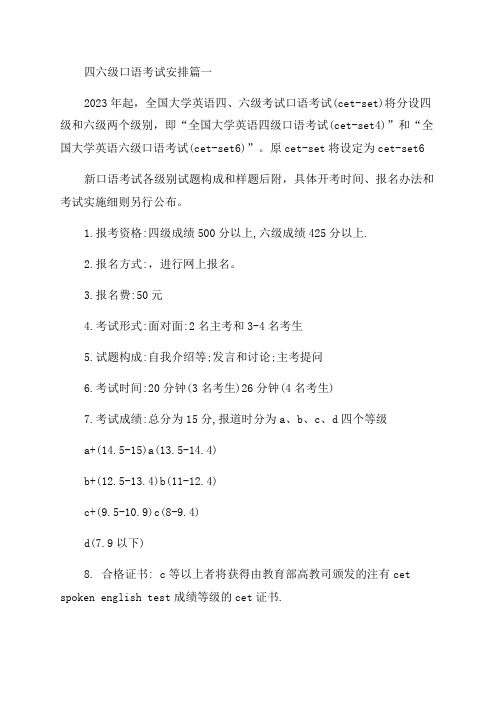
四六级口语考试安排篇一2023年起,全国大学英语四、六级考试口语考试(cet-set)将分设四级和六级两个级别,即“全国大学英语四级口语考试(cet-set4)”和“全国大学英语六级口语考试(cet-set6)”。
原cet-set将设定为cet-set6新口语考试各级别试题构成和样题后附,具体开考时间、报名办法和考试实施细则另行公布。
1.报考资格:四级成绩500分以上,六级成绩425分以上.2.报名方式:,进行网上报名。
3.报名费:50元4.考试形式:面对面:2名主考和3-4名考生5.试题构成:自我介绍等;发言和讨论;主考提问6.考试时间:20分钟(3名考生)26分钟(4名考生)7.考试成绩:总分为15分,报道时分为a、b、c、d四个等级a+(14.5-15)a(13.5-14.4)b+(12.5-13.4)b(11-12.4)c+(9.5-10.9)c(8-9.4)d(7.9以下)8. 合格证书: c等以上者将获得由教育部高教司颁发的注有cet spoken english test成绩等级的cet证书.为适应国家开放的需要,"全国大学英语四、六级考试委员会"从1999 年 11 月起已在部分城市开始实施大学英语四、六级考试口语考试( cet spoken english test )申请参加口语考试的`考生必须是已经获得大学英语四、六级考试证书的在校生,且六级成绩在75分及以上或四六级成绩在80分及以上考点设置:六级口语考试2004年已在全国28个省市的34个城市设立了考点口语考试成绩合格者由教育部高等教育司发给证书,证书分为a、b、c三个等级,成绩低于c等的不发给证书< s("content_relate");。
英语六级口语考试内容及流程
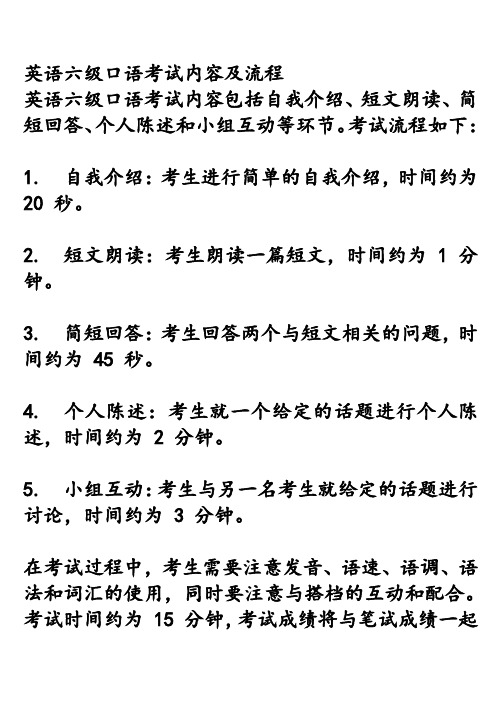
英语六级口语考试内容及流程
英语六级口语考试内容包括自我介绍、短文朗读、简短回答、个人陈述和小组互动等环节。
考试流程如下:
1. 自我介绍:考生进行简单的自我介绍,时间约为20 秒。
2. 短文朗读:考生朗读一篇短文,时间约为 1 分钟。
3. 简短回答:考生回答两个与短文相关的问题,时间约为 45 秒。
4. 个人陈述:考生就一个给定的话题进行个人陈述,时间约为 2 分钟。
5. 小组互动:考生与另一名考生就给定的话题进行讨论,时间约为 3 分钟。
在考试过程中,考生需要注意发音、语速、语调、语法和词汇的使用,同时要注意与搭档的互动和配合。
考试时间约为 15 分钟,考试成绩将与笔试成绩一起
公布。
六级口语题型
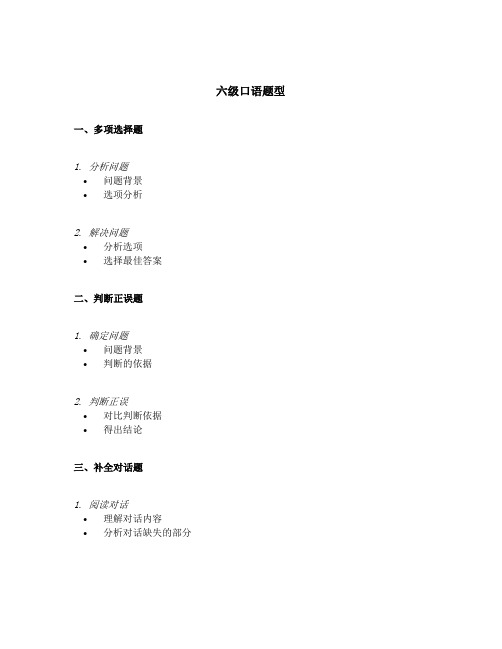
六级口语题型一、多项选择题1. 分析问题•问题背景•选项分析2. 解决问题•分析选项•选择最佳答案二、判断正误题1. 确定问题•问题背景•判断的依据2. 判断正误•对比判断依据•得出结论三、补全对话题1. 阅读对话•理解对话内容•分析对话缺失的部分2. 补全对话•根据语境填写缺失部分•完整对话的流畅性四、短文复述题1. 阅读短文•仔细阅读短文•理解短文主题和内容2. 复述短文•总结短文中的关键信息•复述短文的主要内容五、听力理解题1. 听力材料•仔细聆听听力材料•注意听力材料的关键信息2. 回答问题•根据听力材料回答问题•提取关键信息进行回答六级口语题型解析一、多项选择题多项选择题是在给出问题或情境的基础上,提供若干选项,要求学生在选项中选择最符合问题要求的答案。
这种题型旨在考察学生对问题的分析能力和选择判断的能力。
二、判断正误题判断正误题是在给出问题或论述的基础上,要求学生判断该问题的真伪或论述的正确与否。
这种题型旨在考察学生对问题的理解能力和判断能力。
三、补全对话题补全对话题是给出一段对话的部分内容,要求学生根据语境填写缺失的部分,使对话内容连贯完整。
这种题型旨在考察学生的语言运用能力和语境理解能力。
四、短文复述题短文复述题是给出一篇短文的内容,要求学生根据理解复述短文的主要内容。
这种题型旨在考察学生的听力理解能力和语言表达能力。
五、听力理解题听力理解题是给出一段听力材料,要求学生根据听力材料回答问题。
这种题型旨在考察学生的听力理解能力和信息提取能力。
六级口语考试流程

六级口语考试流程
六级口语考试流程
一、考前准备
1. 适当的复习,考前2~3天准备,多听听录音,多看看一些口语的练习书,平时多准备一些口语话题;
2. 听说练习,尤其重视发音练习,注意语速,语调,重音;
3. 熟悉各项考试规定,如何进行流程、多长时间、答题要求等;
二、具体考试流程
1. 报名:由考生自行报名,并按照报考通知支付相应费用;
2. 发放准考证:在考试当日早晨,考生需要凭借自己的身份证取号,并准备好准考证和身份证等相关证件;
3. 考试开始:考生进入考场后,等待考官指令;
4. 考试阶段:免费口试考试共分为两步,第一步所有考生都会参加,考官会根据各考生口语表达能力进行评分;第二步为考官对个别考生的补充测试,考官会再根据各考生的口语表达能力评分;
5. 考试结束:考官会出正式成绩之后,考试结束,考生应尽快离开考场;
6. 成绩查询:考试成绩会在正式公布之后,可以在网站上查询。
- 1 -。
- 1、下载文档前请自行甄别文档内容的完整性,平台不提供额外的编辑、内容补充、找答案等附加服务。
- 2、"仅部分预览"的文档,不可在线预览部分如存在完整性等问题,可反馈申请退款(可完整预览的文档不适用该条件!)。
- 3、如文档侵犯您的权益,请联系客服反馈,我们会尽快为您处理(人工客服工作时间:9:00-18:30)。
新会话六级考试
一、单项选择题(3分/题,共84分):
01.句子:“我时紧过去。
”中,时紧的意思是:
A.立即
B.一阵间
C.刚刚
D.没有时间
02.对话:“甲:边头有纸巾?
乙:唔day才。
”
请问乙答话的意思是:
A.一个地方
B.附近
C.不知道
D.没有
03.形容词“骨气”的意思是:
A.得意好玩
B.正直坚定
C.风湿骨痛
D.立场不稳
04.句子:“佢要去翻管。
”中,翻管的意思是:
A.上班
B.上学
C.接受劳改
D.修理管道
05.名词“Bang(第四声)企”的意思是:
A.树木
B.枪声
C.企鹅
D.梯子
06.呼喊:“快来捉小摸仔啊!”,中,小摸仔的意思是:
A.贼
B.色狼
C.老鼠
D.一种昆虫
07.句子:“陷罢冷同我企係止!”的意思是:
A.陷罢冷(人名),你给我站住!
B.算了!都跟我一起站起来!
C.全部人都给我站住!
D.你们都跟我对齐!
08.“我件衫湿晒啦!”中,“湿晒”用新会话表达为:
A.削晒
B.烂晒
C.潮晒
D.淋晒
09.新会话中:“co样”代表的意思是:
A.死了一般
B.骂人
C.这样
D.鄙视
10.对于一个极度讨厌的人,你很想打死他,下列哪句是地道的新会话表达?
A.信唔信我插死你?
B.信唔信我拍死你?
C.信唔信我打死你?
D.信唔信我泥死你?
11.新会人喜欢在拜神的时候放一个“bu(第一声)碌”在神柜上作贡品,其中,“bu碌”是指:
A.柑橘
B.菠萝
C.车轮
D.柚子
12.翻译:“前面有两个老吭係止杜气。
”
A.前面有两个武师在练气功。
B.前面有两个老伯在吵架。
C.前面有两个骗子在分赃。
D.前面有两个老师在讨论。
13.形容词:琼Dong(第三声)的意思是:
A.液体凝固
B.气体蒸发
C.固体溶化
D.固体升华
14.桌子使用新会话中表达为:
A.机头
B.棱头
C.柱头
D.堆头
15.句子:“我又被人欺骗了,我真是笨透了。
”使用地道的新会话表达为:
A.我又被人厄鬼,我真係死蠢。
B.我又被人藕閪,我真係傻。
C.我又被人嫩笨,我真係罪Gao密啊。
D.我又被人Dǐng C,我真係笨七(第三声)。
16.九十年代时,新会市区内经常被使用的一种手把机动三轮车,被新会人称为什么:
A.
三脚猫
B.三个碌
C.三叉戟
D.三轮摩托
17.新会话中:“禽劳”是指:
A.蚯蚓
B.蜈公
C.蝙蝠
D.蜘蛛
18.“你係唔係沊我开心啊?”新会话表达为:
A.你索我心戏啊?
B.你Něn我开心啊?
C.你点我心悦啊?
D.你厄我开心啊?
19.“舞”或“Lao”(第三声)的意思是:
A.跳舞
B.跑
C.飞
D.玩
20.“晒Gao(第三声)气”的意思是:
A.浪费唇舌
B.浪费钱
C.浪费力气
D.浪费资源
21.“剥之百喇”的意识是:
A.什么也没有
B.赤手空拳
C.赤裸
D.掏空
22. 新会话中,囊Nei(第3声)的意思:
A.蜻蜓
B.飞蛾
C.蝴蝶
D.螳螂
23.新会话“演京(第三声)”的意思是:
A.演戏
B.炫耀
C.扮演
D.玩弄
24.新会话“麻皮”的意思是:
A.耍赖
B.出麻疹
C.皮肤痕痒
D.不听话
25.“拧史”和“拒史”的意思是:
A.这时、那时
B.那时、这时
C.刹那间、长时间
D.长时间、刹那间
26.“新蚊仔”的意思是:
A.新来的
B.初级生
C.小孩
D.菜鸟
27.“讲时闻”的意思是:
A.说闲话
B.发表演说
C.讨论新闻时事
D.说是非八卦
28.新会话中,形容人年少老成的词是:
A.老閪
B.老鸟
C.老水
D.老积
二、翻译题,(带点词为得分点,翻译成通俗粤语表述或正规语法表述皆可,2分/题,共10分):
1.走Gao(第三声)去啦,睇唔见我係止舞紧电脑嚒?
2.月厚好猛啊,晒到我的的扎,翻屋企抖下先。
3.讲个时闻你听下,拧个阿谁好烂赌,几千万好快脆就输Gao(第三声)晒。
4.唉,近排我一直唔得落着。
5.又颈渴又肚饥,几时先放管啊?
三、情景题(尽量使用地道新会话做答,1分/题,共6分):
1.当你怀疑某个人所说的事情没有根据,存心取悦你的时候,应该说:(提示词:索我心戏)
2.当你遇着贪官在孔子庙前剪彩,你对其行为感到恶心与气愤,你会冲上去对他说:(提示词:“中”死你或“南”(第三声)死你)
3.当你看见一个人在邻家窗前偷偷摸摸,你怀疑他是小偷,你立刻打电话报警,对****说:(提示词:鬼头鬼脑)
4.当你买了一件次品,回家后才发现,便回去找那个奸商退换,你质问他是否欺诈你:(提示词:Něn我笨)
5.当你觉得自己实力不够强,希望取消与对手的决斗时,你跟他说:(提示词:只抽,作收)
6.当你问人在哪里时,你跟他说:(提示词:边止)。
